- Home
- Michael McDowell
The Elementals Page 2
The Elementals Read online
Page 2
Before the funeral began, Big Barbara McCray had poked her daughter, and demanded of her why there was no printed order of service. Leigh shrugged. “Dauphin said do it that way. Less trouble for everybody so I didn’t say anything.”
“And nobody invited!” exclaimed Big Barbara.
“Dauphin is even making the pallbearers wait outside,” Leigh commented.
“But do you know why?” demanded her mother.
“No, ma’am,” replied Leigh, ignorant but uncurious. “Why don’t you ask Dauphin, Mama? He’s sitting right here, hearing every word that you speak to me.”
“I thought you might know, darling. I didn’t want to disturb Dauphin in his sorrow.”
“Barbara, shut up,” said her son Luker. “You know very well why it’s a private funeral.”
“Why?”
“Because we are the only people in Mobile who would have come. There’s no point in advertising a circus when everybody hates the clown.”
“Marian Savage was my best friend,” protested Big Barbara.
Luker McCray laughed shortly and punched his daughter in the ribs. She looked up and smiled at him.
Dauphin Savage, who had attended not very closely to this exchange, turned without rancor and said, “Y’all please be quiet, here’s the priest.”
They knelt to receive the priest’s summary blessing, then rose to sing the hymn “Abide With Me.” Between the second and third stanzas, Big Barbara McCray said loudly, “It was her favorite!” She turned to Odessa across the aisle and a curt bobbing of the dyed feather confirmed this opinion.
As the others sang the Amen, Big Barbara McCray said, “I miss her already!”
The priest read the service of the dead quickly, but with appealing expression. Dauphin Savage rose, moved to the end of the pew—as if he were unworthy a place nearer the coffin—and spoke briefly of his mother.
“Everybody who was lucky enough to know Mama real well loved her very much. I wish I could say she had been a happy woman, but that wouldn’t be the truth. She was never happy after Daddy died. She raised Mary-Scot and Darnley and me with all the love in the world, even though she always said she should have died on the day that Daddy was buried. And then Darnley died too. Everybody knows she had a hard time of it in the last few years—chemotherapy really does something bad to you, everybody knows that, and even then you’re not sure it’s working right. Of course we’re all sorry she’s dead, but we cain’t be sorry that she’s not in pain any more.”
He took a breath and glanced at Marian Savage in her coffin. He turned back, and in a sadder softer voice, went on: “The dress she has on is the one that she wore when I got married to Leigh. It was the prettiest dress she ever had, she said. When she took it off after the reception, she hung it up and said this was what she was saving it for. She would be real happy to see all the flowers here today, to see how much people cared for her. Ever since she died people have been calling up at the house and asking whether they ought to send flowers or make a donation to cancer research, and Leigh and me—whoever answered the phone—would say, ‘Oh, send flowers, Mama didn’t care anything about charity, but she always said that when she died, she hoped there would be a churchful of flowers. She wanted the smell to reach right up to heaven!’”
Big Barbara McCray nodded vigorously, and loudly whispered: “Just like Marian—just like her!”
Dauphin went on: “Before I went to the funeral home I was all upset thinking about Mama dead. But I went in there yesterday and I saw her and now I’m fine. She looks so happy! She looks so natural! I look at her and I think she’s gone sit up in that casket and fuss at me!” Dauphin turned toward the coffin and smiled tenderly at his dead mother.
Big Barbara grabbed her daughter by the shoulder. “Did you have a hand in the eulogy, Leigh?”
“Shut up, Barbara,” said Luker.
“Mary-Scot,” said Dauphin, looking toward the nun, “there anything you want to say about Mama?”
Sister Mary-Scot shook her head.
“Poor thing!” whispered Big Barbara. “I bet she’s just bowed down with grief.”
There was a troubled pause in the proceeding of the funeral. The priest glanced at Dauphin, who still stood at the end of the pew. Dauphin looked toward his sister, who only fumbled with her rosary. The organist peered over his railing above them, as if waiting for a cue to play.
“This is why you need a printed program,” whispered Big Barbara to her son, and looked at him accusingly. “When there’s not a printed program, nobody’s got the least idea in the world what to do next. I could have used a printed program for my scrapbook.”
Sister Mary-Scot stood suddenly in her pew.
“Is she gone speak after all?” asked Big Barbara in a hopeful voice that everyone heard.
Sister Mary-Scot did not speak, but her rising was evidently a signal. The organist, with a clumsy foot sounding discordantly on a couple of bass pedals, clambered down out of his loft, and disappeared through a small side door.
After nodding to Dauphin and to Sister Mary-Scot in somber conspiracy, the priest abruptly turned on his heel. His footsteps echoed the organist’s out of the sanctuary.
It was as if these two functionaries had suddenly determined, for a specific and overpowering reason, to abandon the ceremony before it was finished. And the funeral was certainly not over: there had been no second hymn, no benediction, no postlude. The pallbearers still waited outside the sanctuary. The mourners were left alone with the corpse.
In her vast astonishment at this unaccountable procedure, Big Barbara turned and said loudly to Odessa, who was a dozen yards distant, “Odessa, what do they think they are doing? Where did Father Nalty go? Why has that boy stopped playing the organ—when he gets paid special for funerals, I know he does!”
“Miz Barbara . . .” said Odessa with pleading politeness.
“Barbara,” said Luker in a low voice, “turn around and just shut up.”
She started to protest, but Dauphin said to her in a pained unhappy way, “Big Barbara, please . . .”
Big Barbara, who loved her son-in-law, sat still in her pew, though the effort cost her.
“Please, y’all, pray for Mama for a few minutes,” said Dauphin. Obediently the others bowed their heads.
From the corner of her eye, India McCray saw Sister Mary-Scot pull from beneath her scapular a long narrow black box. She held it tightly in her hands before her.
India flicked a long painted fingernail against the back of her father’s hand. “What has she got?” she whispered to him.
Luker looked over at the nun, shook his head in ignorance, and whispered back: “I don’t know.”
For many seconds then there was no movement in the sanctuary. The air conditioner started up suddenly, drowning the traffic outside. No one prayed. Dauphin and Mary-Scot, embarrassed and evidently most uncomfortable, stood staring at each other across the central aisle. Leigh had shifted a couple of feet down and turned sideways. With her elbow resting on the back of the pew, she held her veil raised so that she might exchange perplexed glances with her mother. Luker and his daughter grasped one another’s hands to communicate their wonder. Odessa stared fixedly ahead of her, as if she could not be expected to evince surprise at anything that was done at the funeral of a woman mean as Marian Savage.
Dauphin sighed loudly and nodded to his sister. Slowly they moved toward the altar, and took stations behind the coffin. They did not look down at their dead mother, but stared grimly ahead of them. Dauphin took the slender black box from the nun, unlatched it and lifted the top. All the McCrays craned but could see nothing of its contents. In the faces of the brother and sister was something at once so terrified and so solemn that even Big Barbara refrained from speech.
From the box, Sister Mary-Scot withdrew a shining knife with a narrow pointed blade about eight inches long. Together, Dauphin and Sister Mary-Scot held the dagger by its polished handle. Twice they passed it over the open space of th
e coffin, and then turned the point of it down over their mother’s unbeating heart.
Big Barbara’s astonishment was so great that she must stand; Leigh clutched her mother’s arm and rose as well. Luker and India followed suit, as did Odessa across the aisle. Standing, the mourners were able to see into the coffin. They half expected Marian Savage to sit up in protest at this extraordinary proceeding.
Sister Mary-Scot let go the handle of the knife. Her hands trembled in the space above the coffin, her lips moved in prayer. Her eyes opened wide as she reached down into the coffin and pulled apart the linen grave-clothes. Marian Savage’s unpainted flesh was distinctly yellow; Sister Mary-Scot pushed aside a prosthesis and uncovered the mastectomy scars. Drawing in his breath sharply, Dauphin raised the knife high.
“Lord, Dauphin!” cried Sister Mary-Scot, “get on with it!”
Dauphin pressed the blade an inch deep into the corpse’s sunken breast. He held it there the length of his shuddering.
He withdrew the knife slowly, as if fearful of causing Marian Savage pain. The blade emerged coated with the mixed coagulated liquids of the unembalmed body. Shuddering anew at the sensation of actually touching the corpse, he placed the knife in his mother’s cold stiff hands.
Sister Mary-Scot flung away the empty black box and it clattered on the polished wooden floor. Quickly she pulled together the graveclothes and without ceremony dropped the top of the coffin over the mutilated body of their mother. She rapped loudly three times on the lid. The sound was distressingly hollow.
The priest and the organist reappeared through the small side door. Dauphin and Mary-Scot dashed to the back of the church together and dragged open the great wooden doors to admit the pallbearers. The six men hurried down the aisle, lifted the coffin on their shoulders and, to the accompaniment of a thunderous postlude, carried it out into the fiery sunlight and blasting heat of that Wednesday afternoon in May.
PART I
SAVAGE MOTHERS
CHAPTER 1
The house in which Dauphin and Leigh Savage lived had been built in 1906; it was a large, comfortable place with generous rooms and careful and pleasing detail in such things as hearths, moldings, frames, and glazing. From the windows on the second floor you could see the back of the great Savage mansion on Government Boulevard. Dauphin’s house was the secondary Savage residence, reserved for younger sons and their wives. Patriarchs, older sons, and dowagers got the Great House, as it was called. Marian Savage had wanted newly-wed Dauphin and Leigh to stay with her in the Great House as long as they remained childless—she possessing no affection for infants or small children—but Leigh refused this invitation politely. Marian Savage’s daughter-in-law said that she would just as soon settle into a place of her own, and pointed out how much more efficient the air conditioning was in the Small House.
And, despite the heat of that Wednesday afternoon, when the temperature at the cemetery had been over 100 degrees, the glassed-in porch at the back of Dauphin and Leigh’s house was almost uncomfortably chilly. The harsh sunlight that prevailed at the front was here filtered through the two great live oaks that separated the backyard of the Small House from the extensive grounds of the mansion. In this generous chamber, filled with heavily upholstered furniture covered in large-patterned chintzes, Big Barbara had removed her shoes and stockings. The quarry tile was cold beneath her feet, and she had plenty of ice in her scotch.
Right now it was only Luker, Big Barbara, and India in the house. Leigh’s two maids had been given the day off in deference to the dead. Big Barbara sat at one end of the great soft sofa, going through a Hammacher-Schlemmer catalog, turning down pages for Leigh to examine particularly. Luker, who had removed his shoes, lay stretched out upon the couch with his feet in his mother’s lap. India sat at the long trestle table behind the couch, reworking on to graph paper the patterns she had memorized in the church.
“House seems empty,” remarked Luker.
“That’s ’cause nobody’s here,” said his mother. “Houses always seem empty after a funeral.”
“Where’s Dauphin?”
“Dauphin went to take Mary-Scot back to Pensacola. We’re hoping he’s gone be back by suppertime. Leigh and Odessa are taking care of things at the church. Luker, listen . . .”
“What?”
“I don’t want any of you to go dying on me, because I just can’t begin to tell you how much trouble it is to arrange a funeral!”
Luker didn’t reply.
“Big Barbara?” said India, when her grandmother was knocking the last ice cube into her mouth.
“What, child?”
“Do they always do that at funerals around here?”
“Do what?” asked Big Barbara uneasily, not turning around.
“Stick knives in dead people.”
“I was hoping you hadn’t been paying attention at that time,” said Big Barbara. “But I assure you, child, it is not a common occurrence. In fact, I have never seen it done before. And I am as sorry as I can be that you had to see it.”
“Didn’t bother me,” shrugged India. “She was dead, wasn’t she?”
“Yes,” said Big Barbara, glancing at her son, hoping that he would interrupt this unhappy exchange. Luker’s eyes were closed, and Big Barbara knew that he meant to give the impression that he was asleep. “But you are still too young to have to know about that sort of thing at all. I went to my first wedding when I was nine, but they wouldn’t let me into a funeral until I was fifteen—and that was after Hurricane Delia, when half the people I knew in the world got blown twenty-five miles up in the air and toothpicks got driven all the way straight through telephone poles. Lots of funerals that month, I can tell you!”
“I’ve seen dead people before,” said India. “One day I was walking to school, and there was a dead man in a doorway. My friend and I touched him with a stick. We wiggled his foot, and then we ran away. And then one afternoon, Luker and I were having dim sum in Chinatown—”
“You were having what? Is that innards?”
“We were in Chinatown having lunch,” India said more simply, “and when we came out of the restaurant we saw two little Chinese girls get run down in the road by a water truck. It was disgusting—we saw their brains and everything. After that I told Luker I would never eat a brain again—and I haven’t, either.”
“That’s terrible!” cried Big Barbara. “Those poor little girls—were they twins, India?”
India didn’t know.
“What a terrible story!” cried Big Barbara, pushing Luker’s feet out of her lap. “That’s just the sort of thing that happens in New York. Now that you’re divorced I don’t see why you still live there.”
“I love New York,” said Luker without opening his eyes.
“So do I,” said India.
“When you got your divorce from . . . that woman, you should have come back home to live.”
“I hate Alabama,” said Luker.
India didn’t say anything.
“Luker,” said Big Barbara, on to her favorite subject, “the happiest day of my life was the day you called up and said you were getting a divorce. I said to Lawton, ‘Lawton,’ I said, ‘I—’”
“Don’t get started,” warned Luker, “we all know what you think about . . . that woman.”
“Then get up and get me some more scotch. Grief has always—ever since I was a little girl—grief has always made my throat dry.”
Luker got up slowly. “Barbara, it’s not four o’clock yet. You guzzled that first drink—”
“I was just trying to get at the ice, I was so thirsty. That cemetery ought to have a water fountain. I don’t know why it doesn’t. People get thirsty at funerals just like they get thirsty everywhere else.”
From the kitchen Luker called, “You’re a drunk, Barbara, and it’s time you did something about it!”
“You’ve been talking to your father!” cried Big Barbara. She turned to India. “Do you treat him as badly as he treats me?”
>
India lifted her red pencil from the graph paper. “Yes.”
“Then you’re a rotten child!” exclaimed Big Barbara. “I don’t know why I waste my love on either one of you!”
Luker brought his mother her drink. “I made it weak. It’s all ice cubes and water. You don’t have any call to be drunk before the sun goes down.”
“My best friend in the world is dead,” replied Big Barbara. “I am toasting her memory.”
“She’ll be toasted all right,” said Luker in a low voice. He threw himself back on to the couch, and again dropped his feet into his mother’s lap.
“Lay ’em flat!” commanded Big Barbara, “so I can put the catalog down.”
There was quiet for some minutes. India continued her painstaking work with a handful of colored pencils; Luker apparently slept; Big Barbara sipped at her drink and turned the pages of the catalog that was propped against Luker’s feet.
“Good God!” said Big Barbara to Luker, and pummeled his knees with her fist. “Did you see this, Luker?”
“See what?” he murmured without curiosity.
“There is an ice cream machine in here that costs seven hundred dollars. It doesn’t even use rock salt. It probably doesn’t even use milk and cream. For that kind of money you just plug it in, and four minutes later you got a half gallon of cherry-peach-vanilla.”
“I’m surprised that Leigh hasn’t got one then.”
“She does!” said Big Barbara, “but I just had no idea that it cost seven hundred dollars! For seven hundred dollars you could make a down payment on a recreational vehicle!”
“Recreational vehicles are in bad taste, Barbara. At least you can hide an ice cream machine in the closet. Besides, Dauphin’s got all the money in the world. And now that Marian Savage has finally had the good taste to kick off, he’s going to have even more. Are they going to move into the Great House?”

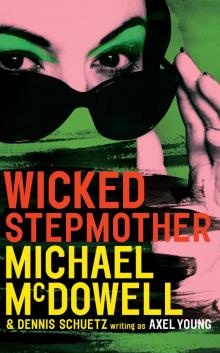 Wicked Stepmother
Wicked Stepmother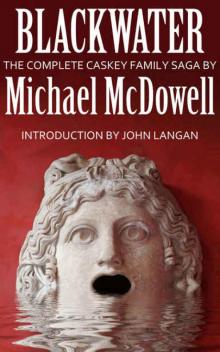 Blackwater: The Complete Caskey Family Saga
Blackwater: The Complete Caskey Family Saga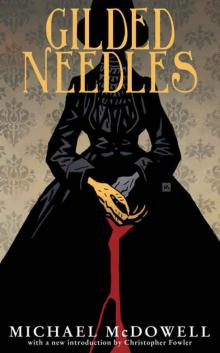 Gilded Needles (Valancourt 20th Century Classics)
Gilded Needles (Valancourt 20th Century Classics)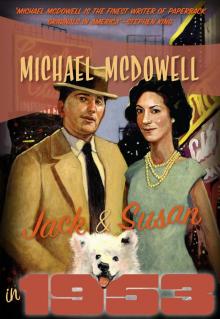 Jack and Susan in 1953
Jack and Susan in 1953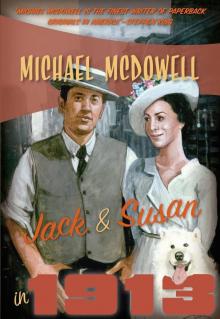 Jack and Susan in 1913
Jack and Susan in 1913 Rain
Rain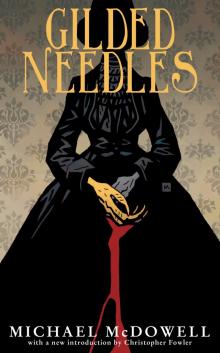 Gilded Needles
Gilded Needles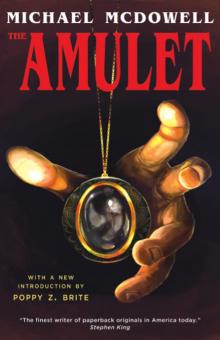 The Amulet
The Amulet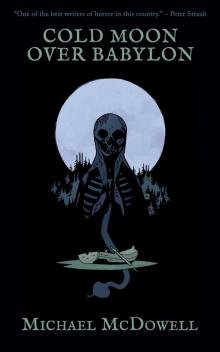 Cold moon over Babylon
Cold moon over Babylon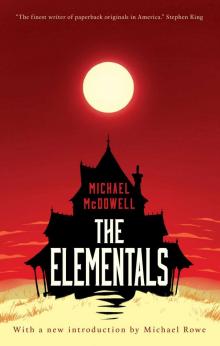 The Elementals
The Elementals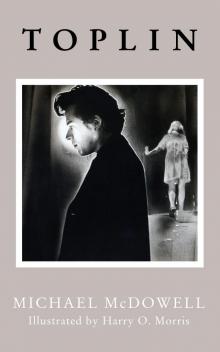 Toplin
Toplin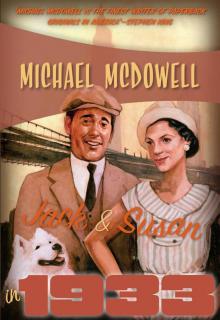 Jack and Susan in 1933
Jack and Susan in 1933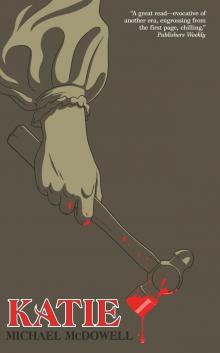 Katie
Katie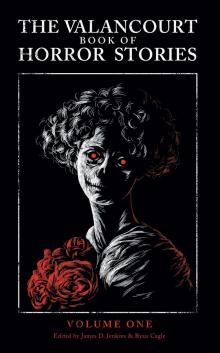 The Valancourt Book of Horror Stories
The Valancourt Book of Horror Stories